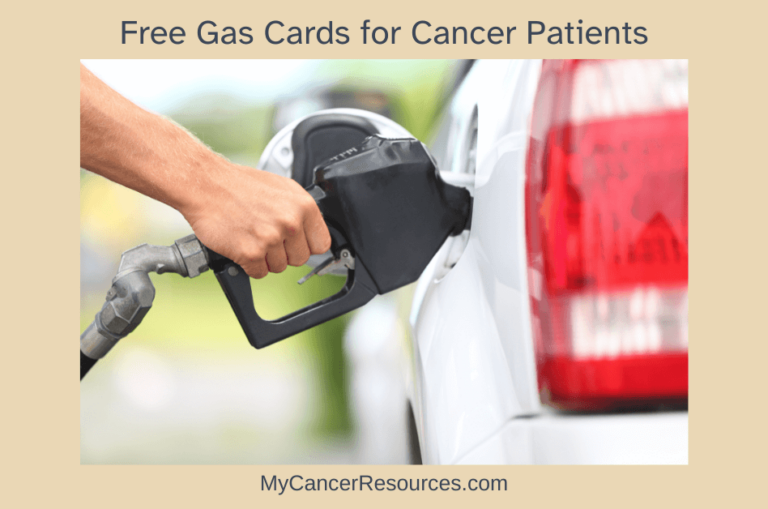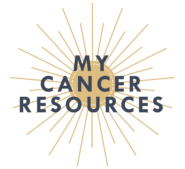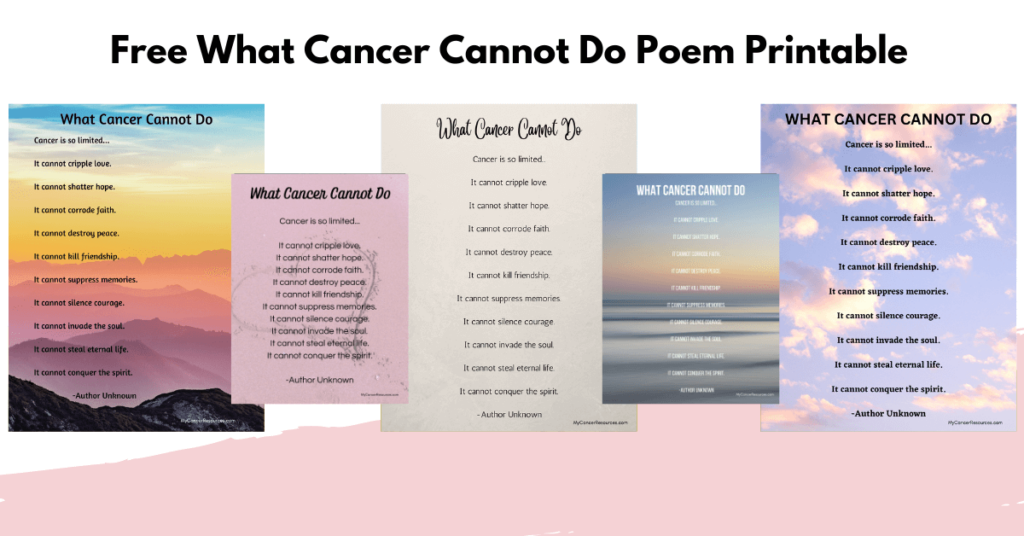
Getting a cancer diagnosis turns your world upside down. Suddenly, there are loads of tests to be run, decisions to be made, doctor visits, and treatments – it’s completely overwhelming.
There’s also the logistics of getting to and from all the appointments for lab work, scans, cancer care at treatment centers, and follow-up appointments.
Gas is expensive as it is, but adding in sometimes hundreds of miles a week on your car? That’s where free gas cards for cancer patients can make a real difference.
Receiving gas cards to offset some of your transportation costs can help ease the burden and stress.
It’s not just about saving some money. Not having to worry about one more expense can let you focus on what’s truly important – fighting cancer and getting better.
In this post, I will share about various organizations that help by providing gas cards as a way of providing financial support to cancer patients and their family members.
I’ve also created other lists you may want to check out about free transportation for people with cancer, free care packages for cancer patients, and free gifts for kids with cancer.
My goal is to help you find the support you need during this challenging time.
Stay tuned for additional resource lists for organizations that provide financial assistance for medical expenses or overdue medical bills, or household expenses, including groceries, utilities, or rent/mortgage payments.
I’m also in the process of researching gifts for teens and young adults with cancer, so keep an eye out for that too.
Currently, the resources listed here are only available to those in the United States. Also, this list is provided for informational purposes and to save you time from searching online for additional resources.
While I have recommended these resources to many former patients and current clients, I am not affiliated with any of these programs, nor do I have any ‘pull’ in getting your application approved.
Each of these programs is open and accepting applications at the time of this writing (September 2024). But you’ll need to look into each to confirm if you’re eligible and then follow the instructions to apply.
There is no guarantee that you will be awarded any of these gift cards, though I certainly hope you are!
Understanding the Financial Burden of Cancer
One of the ways that cancer hits individuals and families the hardest is with finances. Dental care often needs to be completed before treatment can start. There’s the cost of treatment itself, and sometimes health insurance doesn’t cover everything.
There are also the transportation expenses of getting to and from treatment, extra child care costs if a parent has extensive treatment and/or long hospital stays, and many families lose at least one income either because they’re getting treatment or they need to care for their child who has cancer.
The mounting bills add even more stress, as if the stress of dealing with cancer wasn’t enough already.
The Importance of Transportation Assistance
Getting to and from medical appointments can be a big challenge for many facing cancer.
For instance, radiation treatment often takes place multiple days a week. The appointments themselves might not take very long, but the person with cancer has to make arrangements to get there and back home every day for however many weeks the treatment plan calls for.
This can easily max out resources, especially if someone has to travel long distances to get to the treatment center.
Not everyone has easy access to reliable transportation, or has the financial resources to pay for all of those additional round trips.
Some patients choose between having food on the table and paying for a tank of gas to get to treatment. This should never have to be a choice someone has to make.
It’s critical that transportation assistance programs, including providing free gas cards for cancer patients, are available to everyone facing treatment and who needs help.
You shouldn’t have to choose between paying a bill or getting to a hospital for live-saving or live-preserving treatment.
This is why I’ve researched to find and develop this list of organizations that provide free gas cards for cancer patients.
Where to Find Free Gas Cards
Local Community Resources
Most of the time, people with cancer have the most success finding free gas cards when they ask in their local communities.
The first inquiry should be with your oncology social worker. I’ve said it many times on this blog: oncology social workers have the best local connections, and some can seemingly work magic in finding resources to help you.
Talk with your social worker and see if your hospital or treatment center offers free gas cards for cancer patients. They know firsthand about the cost of gasoline in your local area and how accessible/easy public transportation or ride-sharing can be.
Often, hospitals that have a number of patients traveling long distances to receive treatment do provide some sort of assistance.
Your facility may not only provide free gas cards but, if you live quite a distance from it, may arrange for blood draws to take place in your local area so that you don’t have to drive an hour or more to have labs collected.
Your team will work with you as much as possible to make it convenient and place the smallest burden upon you.
Sometimes, though, multiple trips to the hospital cannot be helped, so your social worker can connect you with resources outside of the hospital to help reduce your out-of-pocket costs of getting to and from treatment.
Some of these local charities or faith-based non-profit organizations that can help with transportation gift cards or gas cards include:
- Catholic Charities
- Lutheran Social Services
- Love INC
- St. Vincent de Paul
- United Methodist Church
- Urban League
- United Way
- Salvation Army
You can likely contact other local community organizations and foundations about getting gas cards. Your oncology social worker should have the contact information for these resources.
While the American Cancer Society does not provide free gas cards, they also might know of some agencies you can contact for this and other types of financial help.
Medicaid Benefits
If you have Medicaid, you may be entitled to help with travel to doctor’s offices or medical centers for cancer treatment.
The Non-Emergency Transportation benefits from this government program can be in the form of paying or reimbursing you for gas or even paying for bus fare.
Talk to your Medicaid case worker to see if you’re eligible.
Free Gas Cards for All Cancer Types
The following are available to all eligible people with cancer, regardless of the type of cancer:
Mercy Medical Angels – provides non-emergency medical transportation assistance for ongoing or critical treatment in the form of gas cards, bus or train tickets, and airfare with either volunteer pilots or commercial airline tickets.
The Cancer Card Xchange – distributes restaurant, store, movie theater and gas gift cards to cancer patients.
Note that they close requests when their list of waiting patients reaches 100. Once those requests have been met, they re-open the application process. So, if you’re not able to request a card, check back in a few weeks to see if they’re available.
Free Gas Cards for Specific Types of Cancer
Some organizations focus on a certain type of cancer, so their funding is available to those with that specific diagnosis. Here are the organizations I found that are specific
Breast Cancer
J’s Helping Hand – breast cancer patients who are in active treatment and who have lost household work income can apply to receive a gas card. Applications must include a copy of their driver’s license, a statement of financial hardship, and a letter from the treating provider.
Head and Neck Cancers
Head and Neck Cancer Alliance provides a one-time, $50 gas card to head and neck cancer patients currently in treatment. Applications must be submitted by a member of the care team such as nurse, patient navigator, medical social worker, etc.
Leukemia/Lymphoma
Leukemia and Lymphoma Society – The Patient Aid program can assist those with blood cancers with the cost of gas and parking for outpatient treatment. Check with your social worker or go to lls.org for more information about this program.
Lung Cancer
The Lung Cancer Initiative Gas Card Program is for lung cancer patients who are residents of North Carolina that are currently undergoing treatment.
Recipients are awarded $50 gas cards once every 4 months while in treatment. An Uber gift card can be selected instead of gas cards if desired.
Applications must be completed and signed by both the applicant and the healthcare facility.
Ovarian Cancer
OvarCare provides ovarian cancer patients in active treatment $200 in gift cards ($100 gas gift card and a $100 grocery gift card) for those who meet financial eligibility guidelines and provide income verification documents.
Pediatric Cancers
Alex’s Lemonade Stand – The Travel for Care Program helps children battling childhood cancer have the financial assistance needed to travel to clinical trials and treatments not currently available at their local institution.
Airfare, gas cards and lodging is covered. Up to $4,000 is provided annually. Applications must be submitted by a social worker or a member of the oncology care team.
Compass to Care provides financial assistance for children and a family member to travel to cancer treatment. Travel expenses include airfare, gasoline, lodging, parking fees, taxi, ridesharing and train fare.
Pinky Swear Foundation– the All Star Fund provides assistance to eligible families who have a child currently in treatment for cancer. Gift cards are up to $500 and are provided to assist with groceries and gas.
The National Children’s Cancer Society – the Transportation Assistance Fund covers transportation expenses such as mileage, airfare and lodging when a child needs to stay near the hospital for treatment when nonprofit lodging is unavailable.
Skin Cancer
Patient Advocate Foundation – The Merkel Cell Carcinoma Financial Aid Fund supports patients with this form of skin cancer with a one-time assistance of $1,000 to cover transportation related expenses, lodging, and food or nutritional needs.
Recipients must be in active treatment, have received treatment in the previous 6 months, or will be receiving treatment in the next 60 days.
Location-Specific Resources
Georgia
Loving Arms Cancer Outreach – cancer patients in the following counties can receive up to $1,000 per year for groceries, gas cards, and/or utility bills: Bartow, Carroll, Cherokee, Cobb, Douglas, Paulding, and Pickens.
New York
Lucia’s Angels – provides services to stage 4 breast or gynecological cancers patients in New York, including gasoline gift cards and cab services to transport patients to treatments.
Oklahoma
Patient Advocate Foundation—the Oklahoma Transportation Financial Aid Fund provides prostate cancer patients who are residents of Oklahoma and are currently receiving treatment or are in maintenance therapy with a one-time, $300 grant to offset the out-of-pocket expenses associated with treatment-related transportation needs.
Tenaciously Teal – provides grocery or gas gift cards to ovarian cancer fighters in active treatment who are struggling financially. Applications must be submitted by your social worker or oncology care team.
Oregon / SW Washington
My Breast Friends – supports small financial requests such as grocery or gas gift cards for women currently undergoing breast cancer treatment. Applications must come from your social worker, nurse navigator, or someone else on your case management team.
Pacific Northwest
Northwest Sarcoma Foundation – The Foundation Help$ program provides $250 grants to sarcoma patients currently residing in or undergoing treatment in AK, ID, MT, OR or WA. In some cases, patients may be eligible for an additional $250 six months after the initial grant. Applications must be submitted by an NSWF ‘verified’ social worker.
Texas
Heavenly Mimi – provides gas cards to oncology patients who are residents of Texas and are in active treatment (as confirmed by an oncology health care provider).
Application Process to Receive Free Gas Cards
Each program has its own eligibility criteria and rules. Be sure to read the eligibility requirements carefully.
Some may require you to submit financial statements to demonstrate financial need.
Other programs may only be available to people with certain types of cancer or who live in a specific area.
You’ll need to gather all of the paperwork that’s required, which may also include a letter from your oncology social worker or another member of your oncology healthcare team. You’ll then complete the application form and submit everything.
Then, you just need to wait to hear back to see if you’ve been accepted. Depending on how many applications the organization has received, it may take a few days up to a month or longer to hear back.
Final Thoughts
Programs that provide free gas cards for cancer patients can make a valuable impact by easing some of the financial challenges of the frequent trips back and forth to doctor’s appointments and medical treatment.
Cancer treatment-related expenses add up quickly. Even though a free gas card isn’t huge dollar amount-wise, it’s free money, and every little bit can help.
Most importantly, it means you won’t have to feel like you need to choose between getting treatment and paying another bill for your basic needs, or putting food on the table.
I’ll update this list as I find additional resources that provide free gas cards for cancer patients.
So, check back and see if I’ve found another nonprofit organization that offers this valuable resource!
If you know of a resource I’ve missed, please let me know and I’ll add it to the list.



